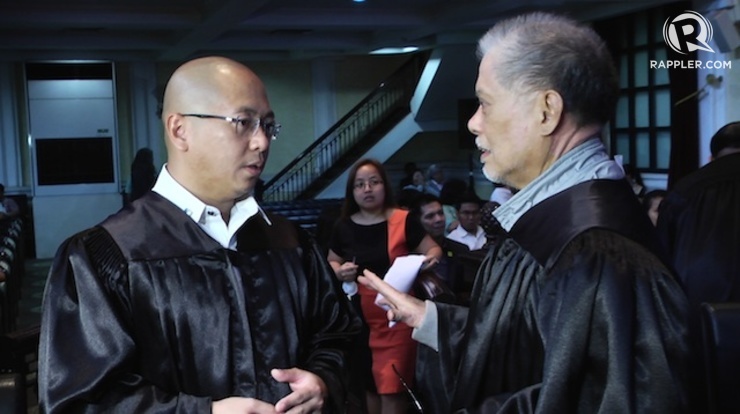While the focus of the legal battle has been whether EDCA needs Senate ratification, Supreme Court justices have grilled petitioners and Acting Solicitor General Florin Hilbay about the benefits of EDCA

ORAL ARGUMENTS ON EDCA: Acting Solicitor General Florin Hilbay and Anti-EDCA petitioner former Senator Rene Saguisag. Rappler photo
Under questioning by a Supreme Court justice, the Philippine government's chief counsel conceded on Tuesday, November 25, that the new military agreement between
"There is no
guarantee, your honor, but this helps. We have to live in a real world. We have
limitations," said Acting Solicitor General Florin Hilbay on the 2nd and
last day of oral arguments on the Enhanced Defense Cooperation Agreement
(EDCA).
Supreme Court
Associate Justice Antonio Carpio was testing Hilbay's argument that the EDCA is
part of the country's defensive preparation.
"In order to
more effectively achieve the objective of this treaty, the parties, separately
and jointly, by self-help and mutual aid, will maintain and develop their
individual and collective capacity to resist armed attack. The government's
comment submitted to Supreme Court claimed that the agreement is needed to
defend the West Philippine Sea ," Carpio
said.
But this is not
what happened in 2012, the justice said.
Carpio went back
to the 2012 incident in the Scarborough Shoal (Panatag), where the United States did not come to the aid of the Philippines when China
took effective control of the shoal off the coast of Zambales province in Luzon .
"China US
He also cited the
failure of the US to come to
Ukraine 's help when
Russia-backed insurgents took Crimea .
"There is no
guarantee, in other words, that Americans will come to our aid if we invoke the
Mutual Defense Treaty," Carpio said. Hilbay conceded.
This is when
Carpio asked Hilbay: "What is the value of EDCA if there is no guarantee
of assistance?"
Hilbay suggested
that US "can change its mind" on assisting the Philippines Philippines and other countries laying claim on
the West Philippine Sea (South China Sea ).
"There is no
guarantee, your honor, but this helps. We have to live in a real world. We have
limitations," said Hilbay.
Carpio replied:
"We live in a real world. We lost Scarborough Shoal inspite of MDT."
Outside the
context of West Philippine Sea , Hilbay
enumerated a range of benefits in terms of training, prepositioning of assets,
and improvement of military facilities, runways, barracks, and ports.
While the focus
of the legal battle has been whether EDCA stands as an executive agreement or
it needs Senate ratification, the Supreme Court justices themselves have gone
back and forth grilling petitioners and Hilbay about the implemenation of the
new military-to-military agreement in relation to the West
Philippine Sea .
With the Philippines having one of the weakest militaries
in Asia, the Aquino goverment has said that EDCA is necessary to improve the
country's "minimum credible defense" in light of aggressiveness in
the West Philippine Sea .
The EDCA allows
the US
At one point,
Hilbay begged off questions on the benefits of EDCA and sought to redirect
questions on its constituationality.
"This might
be a whole range of responses that the President as commander in chief wants to
use. These are military matters. If there are experts on miltiary matter, that
will be the Department of National Defense. If there are experts on diplomacy,
that is the Department of Foreign Affairs. My role is to defend the
constituationality of the defense agreement," Hilbay said.
Not
foreign military bases
The focus of
Hilbay's argument was that the constitutional requirement for "treaties
and international agreement" to be ratified by the Senate does not apply
to EDCA. He said it is a mere implementation of existing treaties already
ratified by the Senate – the Mutual Defense Treaty of 1951 and the Visiting
Forces Agreement of 1999.
Hilbay also
argued that not all international agreements need to be submitted to Senate. It
is a "characterization" dependent on the position of the President
and the Senate. He noted that no senator filed a petition to question the
constitutionality of EDCA before the Supreme Court.
The
constitutional requirement also applies only to foreign military bases, which
Hilbay said is not the case with the facilities that will be built by the US
In a power point
presentation at the start of Day 2 of oral arguments, Hilbay showed particular
provisions to argue that EDCA is a mere implemenation of these treaties.
VFA, Article VIII
Aircraft operated
by or for the US armed
forces may enter the Philippines
upon approval of the Government of the Philippines
Vessels operated
by or for the US armed
forces may enter the Philippines
upon approval of the Government of the Philippines
Hilbay added the
EDCA is unlike foreign basing because it is "restrictive" in the
sense that the US
http://www.rappler.com/nation/76069-edca-no-guarantee-west-philippine-sea

No comments:
Post a Comment
Note: Only a member of this blog may post a comment.